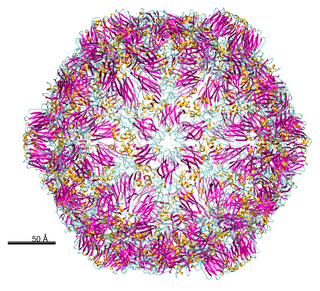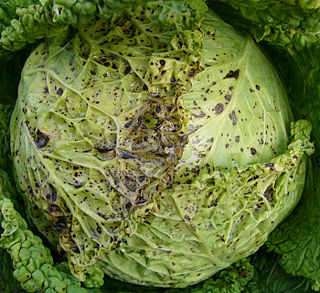
Ullucus is a genus of flowering plants in the family Basellaceae, with one species, Ullucus tuberosus, a plant grown primarily as a root vegetable, secondarily as a leaf vegetable. The name ulluco is derived from the Quechua word ulluku, but depending on the region, it has many different names. These include illaco, melloco, chungua or ruba, olluco or papalisa, or ulluma.
A satellite is a subviral agent that depends on the coinfection of a host cell with a helper virus for its replication. Satellites can be divided into two major classes: satellite viruses and satellite nucleic acids. Satellite viruses, which are most commonly associated with plants, are also found in mammals, arthropods, and bacteria. They encode structural proteins to enclose their genetic material, which are therefore distinct from the structural proteins of their helper viruses. Satellite nucleic acids, in contrast, do not encode their own structural proteins, but instead are encapsulated by proteins encoded by their helper viruses. The genomes of satellites range upward from 359 nucleotides in length for satellite tobacco ringspot virus RNA (STobRV).

Tobamovirus is a genus of positive-strand RNA viruses in the family Virgaviridae. Many plants, including tobacco, potato, tomato, and squash, serve as natural hosts. Diseases associated with this genus include: necrotic lesions on leaves. The name Tobamovirus comes from the host and symptoms of the first virus discovered.

Potyvirus is a genus of positive-strand RNA viruses in the family Potyviridae. Plants serve as natural hosts. Like begomoviruses, members of this genus may cause significant losses in agricultural, pastoral, horticultural, and ornamental crops. More than 200 species of aphids spread potyviruses, and most are from the subfamily Aphidinae. The genus contains 190 species and potyviruses account for about thirty percent of all currently known plant viruses.

Begomovirus is a genus of viruses, in the family Geminiviridae. They are plant viruses that as a group have a very wide host range, infecting dicotyledonous plants. Worldwide they are responsible for a considerable amount of economic damage to many important crops such as tomatoes, beans, squash, cassava and cotton. There are 445 species in this genus.

Nepovirus is a genus of viruses in the order Picornavirales, in the family Secoviridae, in the subfamily Comovirinae. Plants serve as natural hosts. There are 40 species in this genus. Nepoviruses, unlike the other two genera in the subfamily Comovirinae, are transmitted by nematodes.
Andean potato latent virus (APLV) is a plant pathogenic virus of the family Tymoviridae.

Peanut mottle virus(PeMoV) is a pathogenic plant virus of the family Potyviridae. As with other members of this virus family, PeMoV is a flexuous filamentous virus with particles 740–750 nm long. It is transmitted by several species of aphids and by mechanical inoculation. It was first given its name in 1965 when it was isolated from peanuts (Arachis hypogaea) in Georgia, United States. The virus was found to be seed transmitted in its host.
Pepper mottle virus (PepMoV) is a plant pathogenic virus in the genus Potyvirus and the virus family Potyviridae. Like other members of the Potyvirus genus, PepMV is a monopartite strand of positive-sense, single-stranded RNA surrounded by a capsid made for a single viral encoded protein. The virus is a filamentous particle that measures about 737 nm in length. Isolates of this virus has been completely sequenced and its RNA is 9640 nucleotides long. This virus is transmitted by several species of aphids in a nonpersitant manner and by mechanical inoculation.
Soybean chlorotic mottle virus (SbCMV) is a plant pathogenic virus of the family Caulimoviridae, genus Soymovirus.
Sweet potato feathery mottle virus (SPFMV) is a member of the genus Potyvirus in the family Potyviridae. It is most widely recognized as one of the most regularly occurring causal agents of sweet potato viral disease (SPVD) and is currently observed in every continent except Antarctica. The number of locations where it is found is still increasing; generally, it is assumed that the virus is present wherever its host is. The virus has four strains that are found in varying parts of the world.
Sweet potato mild mottle virus (SPMMV) is a plant pathogenic virus of the family Potyviridae.
Umbravirus is a genus of plant viruses assigned to the family Tombusviridae. The genus has 11 species.

Potexvirus is a genus of pathogenic viruses in the order Tymovirales, in the family Alphaflexiviridae. Plants serve as natural hosts. There are 48 species in this genus, three of which are assigned to a subgenus. Diseases associated with this genus include: mosaic and ringspot symptoms. The genus name comes from POTato virus X).

Carlavirus, formerly known as the "Carnation latent virus group", is a genus of viruses in the order Tymovirales, in the family Betaflexiviridae. Plants serve as natural hosts. There are 53 species in this genus. Diseases associated with this genus include: mosaic and ringspot symptoms.
Ipomovirus is a genus of positive-strand RNA viruses in the family Potyviridae. Member viruses infect plants and are transmitted by whiteflies. The name of the genus is derived from Ipomoea – the generic name of sweet potato. There are seven species in this genus.
Badnavirus is a genus of viruses, in the family Caulimoviridae order Ortervirales. Plants serve as natural hosts. There are 67 species in this genus. Diseases associated with this genus include: CSSV: leaf chlorosis, root necrosis, red vein banding in young leaves, small mottled pods, and stem/root swelling followed by die-back. Infection decreases yield by 25% within one year, 50% within two years and usually kills trees within 3–4 years.

Comovirus is a genus of viruses in the order Picornavirales, in the family Secoviridae, in the subfamily Comovirinae. Plants serve as natural hosts. There are 15 species in this genus.

Tymovirus is a genus of viruses in the order Tymovirales, in the family Tymoviridae. Plants serve as natural hosts. There are 28 species in this genus.









